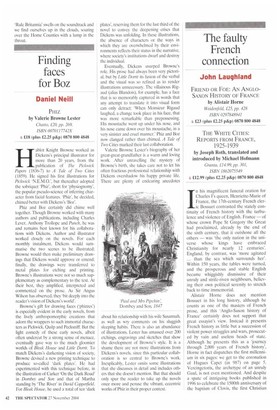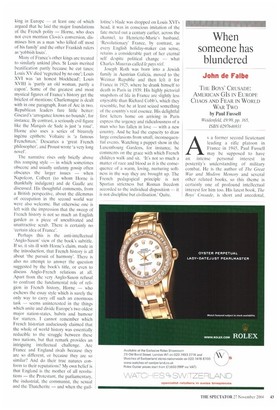The faulty French connection
John Laughland
FRIEND OR FOE: AN ANGLOSAXON HISTORY OF FRANCE by Alistair Home Wodenfeld, £25, pp. 428 ISBN 0297848941 & £23 (plus £2.25 p&p) 0870 800 4848 THE WHITE CITIES: REPORTS FROM FRANCE, 1925-1939 by Joseph Roth, translated and introduced by Michael Hofmann Granta, £14.99, pp. 301, ISBN 1862075549 & £12.99 (plus £2.25 p&p) 0870 800 4848 In his magnificent funeral oration for Charles I's queen, Henriette-Marie of France, the 17th-century French cleric Bossuet contrasted the stately continuity of French history with the turbulence and violence of English. France — of whose crown Pope St Gregory the Great had proclaimed, already by the end of the sixth century, that it outshone all the others — was 'the only nation in the universe whose kings have embraced Christianity for nearly 12 centuries'. England, by contrast, was 'more agitated ... than the sea which surrounds her'. Within 150 years, the tables were turned, and the prosperous and stable English became whiggishly dismissive of their unruly and strife-riven neighbours, believing their own political serenity to stretch back to time immemorial.
Alistair Horne does not mention Bossuet in his long history, although he counts as one of the masters of French prose, and this 'Anglo-Saxon history of France' certainly does not support that great essayist's view. Instead it presents French history as little but a succession of violent power struggles and wars, prosecuted by vain and useless heads of state. Although he presents this as a 'journey through 2,000 years of French history', Home in fact dispatches the first millennium in six pages: we get to the coronation of Hugues Capct (in 987) on page 5. Vercingetorix, the archetype of an unruly Gaul, is not even mentioned. And despite a spate of intriguing books published in 1996 to celebrate the 1500th anniversary of the baptism of Clovis, the first Christian king in Europe — at least one of which argued that he laid the major foundations of the French polity — Horne, who does not even mention Clovis's conversion, dismisses him as a man 'who killed off most of his family' and the other Frankish rulers as 'yobbish louts'.
Many of France's other kings are treated to similarly unkind jibes. St Louis merited beatification partly because he cut taxes; Louis XV died 'regretted by no one'; Louis XVI was 'an honest blockhead'; Louis XVIII is 'partly an old woman, partly a capon'. Some of the greatest and most mystical figures of France's history get the briefest of mentions: Charlemagne is dealt with in one paragraph, Joan of Arc in two. Republican leaders fare little better: Giscard's 'arrogance knows no bounds', for instance. By contrast, a seriously evil figure like the Marquis de Sade is just 'a roué'. Home also uses a series of bizarrely ingenu epithets: Voltaire is 'a famous Frenchman,' Descartes a 'great French philosopher', and Proust wrote 'a very long novel'.
The narrative rises only briefly above this romping style — in which sometimes obscene and usually unfunny gossip often obscures the larger issues — when Napoleon, Colbert (to whom Home is thankfully indulgent) and de Gaulle arc discussed. His thoughtful comments, from a British perspective, about the dilemmas of occupation in the second world war were also welcome. But otherwise one is left with the impression that the sweep of French history is not so much an English garden as a piece of uncultivated and unattractive scrub. There is certainly no 'certain idea of France'.
Perhaps this is the anti-intellectual 'Anglo-Saxon' view of the book's subtitle. If so, it sits ill with Home's claim, made in the introduction, that French history is all about 'the pursuit of harmony'. There is also no attempt to answer the question suggested by the book's title, or even to discuss Anglo-French relations at all. Apart from the very Anglo-Saxon refusal to confront the fundamental role of religion in French history, Home — who eschews the essay style which is surely the only way to carry off such an enormous task — seems uninterested in the things which unite and divide Europe's two oldest major nation-states, hubris and humour for starters. I cannot remember which French historian audaciously claimed that the whole of world history was essentially reducible to the struggle between these two nations, but that remark provides an intriguing intellectual challenge. Are France and England rivals because they are so different, or because they are so similar? And do their true natures conform to their reputations? My own belief is that England is the mother of all revolutions — the Protestant, the parliamentary, the industrial, the communist, the sexual and the Thatcherite — and when the guil
lotine's blade was dropped on Louis XVI's head, it was in conscious imitation of the fate meted out a century earlier, across the channel, to Henriette-Marie's husband. 'Revolutionary' France, by contrast, as every English holiday-maker can sense, retains a considerable part of her eternal self despite political change — what Charles Maurras called le pays reel.
Joseph Roth was born into a Jewish family in Austrian Galicia, moved to the Weimar Republic and then left it for France in 1925, where he drank himself to death in Paris in 1939. His highly pictorial snapshots of life in France are slightly less enjoyable than Richard Cobb's, which they resemble, but he at least seized something of the country's real essence. His delightful first letters home on arriving in Paris express the urgency and ridiculousness of a roan who has fallen in love — with a new country. And he had the capacity to draw large conclusions from small, inconsequential events. Watching a puppet show in the Luxembourg Gardens, for instance, he comments on the grace with which French children walk and sit. 'It's not so much a matter of race and blood as it is the consequence of a warm, loving, nurturing softness in the way they are brought up. The French pedagogical principle is not Spartan strictness but Roman freedom accorded to the individual disposition — it is not discipline but civilisation.' Quite.



















































































 Previous page
Previous page